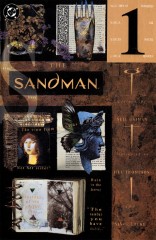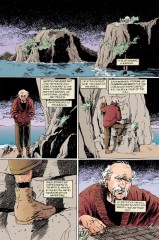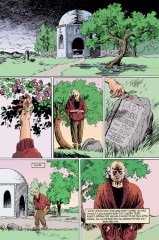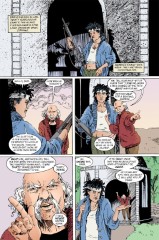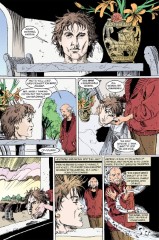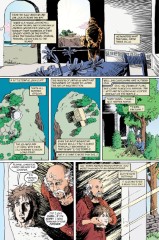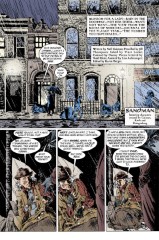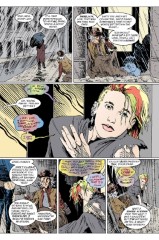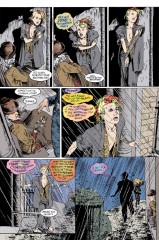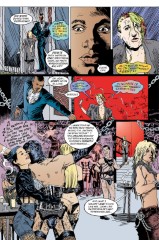Issue 41: Brief Lives: Chapter One
Neil Gaiman, Jill Thompson, and Vince Locke
- First part of storyline, Brief Lives
- First story reprinted in trade paperback Brief Lives
- Audible Act III Chapter 4
Notes: Brief Lives is in common use as a title, dating back to the earliest-reported citation, a collection of short biographies by John Aubrey, published in 1813.
Probably because of Delirium's presence, there is a motif of eyes in Brief Lives. The dialog is filled with references to eyes, sight, and seeing, and the art is filled with closeups where eyes are clearly visible. The title Brief Lives gives away one of the themes of the book. We see explicitly in #43 that even the long-lived have brief lives; as Death tells Capax, "You lived what anyone gets, Bernie. You got a lifetime." Dream calls Orpheus' life short. We observe the ending of many lives, from Ruby's short span to Capax and even to the goddess Ishtar. In a sense, then, all lives, except those of the Endless, are "brief".
Yet even the Endless are not so. Their "lives" have the same turmoil as ephemerals: The troubled younger sister, the estrangement of a brother. We even learn of the "death" and replacement of a incarnation of Despair, and we conclude with Orpheus' quietus, in which Dream effectively summons the Kindly Ones, who are expected put an end to Dream's own brief life.
In fact, the briefness of life is an aspect of the larger theme, which is that of change--change which is personified in the form of Destruction. Everything changes; that is natural law. The change of greatest concern for the story is the change in the main character, Dream. The archetype of change even points out the change to us! Brief Lives starts to pull the larger Sandman story into focus, how Dream changes as a result of his imprisonment, building toward an inevitable conclusion. The story arc is divided into two four-issue parts with an epilog.
The two part parallel each other in structure; compare particularly #41 and #45, where the Endless interact, and #44 and #48, where Ruby dies and Destruction departs while Dream does nothing. The epilog in #49 reprises the theme of the arc with Orpheus' death, and reprises the events of the arc in the "where are they now" segment.
Cover: Any art historians out there? Two items that catch the eye are a Rembrandt-like portrait and the head of a Greek or Greek-revival statue.
1: Blossom for a Lady
Page 1#
Panel 1
The island is Naxos, one of the Cyclades, a chain between Greece and Turkey.
Panel 3
Head of the family: A pun.
Page 2#
Panel 4
The epitaph is from the poem "An English Padlock", by Matthew Prior (1664-1721).
Panel 5
You can just see someone hiding behind a tree in the background.
Page 3#
Panel 1
Driven by dark dreams: Confirmation that Dream is responsible for Orpheus's guardians is given in Sp1:48.1 and 49:12.2.
Panel 4
Note the gold tooth. The recovery of Orpheus was accomplished by Lady Johanna in 1794, in #29, making his loss c. 1764. The date holds no particular meaning for me.
Page 4#
Panel 1
Note that Orpheus' earring has been returned and his earlobe has regenerated.
Page 5#
Panel 1
The house across the bay is, of course, significant.
Panel 6
Rhodocanakis? Rhodo- is a combinational form meaning "rose". Note the contrast between Naxos's weather and the next scene.
2: Rain in the Doorway
Rain in The Doorway is a book by Thorne Smith, which is described as:
a really funny (in more than one sense) fantasy novel from 1933. It begins with a man standing in the doorway of a department store to escape a torrential downpour. Rain dripping down his nose, he feels depressed and dissatisfied... and the doorway behind him opens, a hand reaches out to grab him and he's drawn through into another universe. It seems much like ours, except that people take things much less seriously... as with all Thorne Smith books (he's best known for Topper) there is much drunkenness and nudity and silly dialog.
Page 6#
Panel 1
50p: p is the abbreviation for pence. 100 pence make a pound (£1) in British money.
Panel 3
A good innings: Innings (singular) is a fragment of a cricket match. The word was subsequently adopted in slightly different form in baseball, but its use here is clearly from cricket.
Panel 4
Hindustrial haccident: a representation of Cockney, a type of lower-class British accent, noted for aspirating word-initial vowels.
Page 7#
Panel 2
Natter: British slang for chatty small talk.
The rhino: Uncertain slang, probably having to do with the animal's horn.
Panel 3
Delirium's eyes were colored incorrectly in some editions. They should be: right eye green, left eye blue.
Panel 4
Aunt Fanny: An expression of disbelief. See Appendix.
Page 8#
Panel 5
The Wayward Bus: A 1957 movie directed by Victor Vicas, starring Joan Collins and Jayne Mansfield, a generally dreary adaptation of John Steinbeck's novel about passengers on a bus. There is no "Rita Marlowe" in the novel, and no actress of that name appearing in any major role in the film. It is more than possible that Delirium is confused.
Delirium might be thinking of Marilyn Monroe in Bus Stop. Monroe played a young girl dissatisfied with her life who takes a bus to the big city and hooks up with a cowboy there. Del may be mixing Monroe's name up with that of Rita Haywood, another actress of similar presence.
Panel 7
Possibly long-term foreshadowing, given Destruction's comments in 48:17.4
3: Not Her Sister
Page 9#
Panel 1
Warehouse bash: Another name for a Rave, a all-night party attended by teenagers, often dressed much like Delirium is here. Raves are noted for rampant drug use.
Panel 3-4
This scene is reminiscent of similar scenes in comics and movies, and is repeated by Dream in 45:16.6. In the 1977 movie Star Wars, Obi-Wan Kenobi uses the "Force" on stormtroopers to convince them that "these aren't the droids you're looking for". In Hellblazer, street magician John Constantine, an expert at instant hypnosis, bulls his way into a university club by convincing the doorman that he is a guest of a member, and is dressed formally.
Panel 4
Note the graffiti: "pervy" referring to an illustration of nipple chains; "stop defacing public property"; "Going down" next to genitals, referring to oral sex.
Aqueous humor, from the Latin meaning "watery fluid", is the watery, transparent material between the cornea and lens. Vitreous humor, from the Latin meaning "glassy fluid", is the gelatinous, transparent material between the lens and the retina.
Panel 5
The song is "Tear in Your Hand" by Tori Amos, from the album little earthquakes. The next line is
If you need me, me and Neil will be hanging out with the Dream King
Neil says hi, by the way.Neil is acknowledged in the liner notes of the album. The lyrics on page 10 are also from this song. Note the legal information at the end of the lettercol this issue.
Freddie....: A reference to Freddie Mercury of Queen, a bisexual man who died of AIDS in 1991. One of Queen's most popular songs is "Another One Bites the Dust."
Page 10#
Panel 2
Del's lines here may be a reference to the title song of Tori's album.
Panel 4
Delirium has mistaken Lisa for Death, obviously.
Page 11#
Panel 3
E'd out of her little bonce: E is British slang for the drug Ecstasy, a euphoric hallucinogen related to LSD. (X is the more common term in America.) Ecstasy is a common drug at Raves (see 9.1). Bonce is presumably slang for head.
Panel 4
Obviously, this is Desire, another of Delirium's siblings.
4: Want/Not Want
Page 13#
Panel 2
Note Desire's change of clothing. It is not normally so unambiguous in its sexuality. The clothing appears to date from the 1920's "flapper" style.
The unusual pattern on the "walls" are the cells of the Threshold, Desire's stronghold, which is in the form of its body. What part of the body are they in? The cells seems to resemble skin cells, I think.
The floor is physically reacting to (or is disturbed by) Delirium's presence.
Panel 3-4
Delirium turns into a swarm of butterflies here, if it's not clear.
Page 14#
Panel 1
You used to be: Presumably when Delirium was Delight.
Panel 4
This is an image of Destiny's book. Compare to #21, where Delirium confronts Destiny with her knowledge of things that aren't in his book.
Panel 6
Drop it: Does Desire regret her plan for revenge on Dream, now that his captivity has changed him?
Page 15#
Panel 2
Delirium is wrong. Not-wanting is a kind of wanting.
5: The View from the Back of Mirrors
Page 16#
Panel 1
Silver flecks: "Floater" is the common term for tiny bits of matter which float in the vitreous humor. Natural floaters are flakes of detached retina or the remains of a vein which fed parts of the eye during gestation and subsequently withered. Other floaters are small parasites who found their way into the eye and couldn't get back out.
Floaters accumulate with age or with physical trauma.
Panel 4
A recent Supreme Court case concerned a Nebraska man who was entrapped (hounded, even) into buying child pornography by agents of the federal government. There is probably not a connection.
Page 17#
Panel 4
Pets: Destiny's garden is full of "little flappy things". Death has two goldfish named Slim and Wandsworth. Dream has ravens, such as Matthew. Destruction keeps dogs, as we will see. Desire does not seem to have pets. Despair has rats. Delirium is acquired by a pet in #48, and has shown a tendency to break apart into butterflies (page 13), or to create frogs (#31, #43) or hummingbirds (page 20).
Page 18-20#
- Note Despair's use of pain to distract her from unpleasant topics.
Page 20#
Panel 2
Blind hummingbirds: an example of the eye motif.
Panel 5
An extreme example of the eye motif. (Consider also Seduction of the Innocent, a 1950's, anti-comics diatribe, which featured much discussion of the "injury to the eye" motif.)
6: Journal of the Plague Year
- Journal of the Plague Year is by Daniel Defoe (better known for Robinson Crusoe). Defoe lived from c.1661-1731, so he was a young child during the plague of 1665.
Page 21#
Panel 1
The plague was actually spread by fleas, which were, of course, carried by dogs and cats. Rats, however, are generally credited with first bringing bubonic plague to Europe.
There were three forms of plague in the epidemics. Bubonic was the most common and the least lethal, with a fatality rate of 60-90% depending on treatment and surrounding conditions. Septicemic and pneumonic plague were both nearly 100% lethal.
The Black Plague killed about 25 million people, amounting to some 20-45% of the people of Europe in the years 1348-1351; the figure is conventionally given as one-third. Peasants and clergy were the most affected.
The London Plague of 1665 claimed more than 70,000 lives out of a population of about 500,000. The plague had been virtually unknown in England for more than a century previous.
Panel 2
Lord have mercy upon uf: The "long s" form of the letter "s" resembles a lower-case "f". It is now obsolete.
Page 22#
Panel 1
This is a quote from the aforementioned work by Defoe.
Panel 3
Wheel: A symbol from Indian philosophy, representing the cycle of life: birth, growth, death, decay. In other words, change.
Note that we cannot see Destruction's eyes clearly.
Page 23#
Panel 2
As Dream's domain encompasses imagination and creativity, so does Destruction's realm include change.
Panel 6
This fixes Destruction's departure c. 1695. Historical significance?
7: "The Number You Have Dialed..."
- This is a quote from a telephone industry recording informing the dialer that the number she is trying to reach is out of service.
Credits
- Originally collated and edited by Greg Morrow.
- Joel Tscherne (ac985@cleveland.Freenet.Edu) identified Lady Johanna's epitaph and pointed out Delirium's matched eyes.
- Joseph Brenner (doom@leland.Stanford.EDU) identified some of the chapter titles' sources.
- Carl Fink (carlf@panix.com) noted the antecedents of the doorman scene.
- Roy Daniel (royd@ERE.UMontreal.CA) identified the song playing in the B&D club.
- Greg McElhatton STU_GLMCELHA@VAX1.ACS.JMU.EDU corrected my misapprehension of Tori's lyrics.
- Tara O'Shea tara@uxa.cso.uiuc.edu, Kenneth Jennings (kiii@carson.u.washington.edu), and Michael Gemar (michael@psych.toronto.edu) provided information on The Wayward Bus.
- Michael Gemar also compared Del's force of will to Ben Kenobi and interpreted graffiti.
- Kenneth Jennings also noted Freddie Mercury's sexuality and identified the wheel and the title.
- One of the Francis Uy's ac999266@umbc.edu defined "warehouse bash", and confirmed the slang for "Ecstasy".
- Andy D adu@compsci.stirling.ac.uk identified "E" and commented on graffiti.
- Laura Atkinson atkinson@owlnet.rice.edu identified "E"
- David James (vnend%nudity@Princeton.EDU) corrected lyrics and noted Freddie's bisexuality, and provided the Appendix.
- Bill "Insert Stupid Tank Joke" Sherman sherman@math.ucla.edu noted a cricket reference, quoted lyrics, and noted Freddie's bisexuality.
- Susannah Gort sjg@maths.warwick.ac.uk noted that "going down" also means "going to prison".
- Mason Hart MHART00@ricevm1.rice.edu noted that Capax probably predates Ishtar, examined graffiti, corrected lyrics, and gave extensive information on the plague.
- Stephen White sfwhite@sciborg.uwaterloo.ca identified raves and "E".
- Si Rowe sirowe@pop.cis.yale.edu noted a pun, Dream's investment of the priests in the Special, the rhino, and foreshadowing.
- Andrew Farrell (afarrell@maths.tcd.ie) noted Desire's domain.
- David Henry (dhenry@plains.NoDak.edu) noted a possible Tori ref, and added a kind of floater.
- Carl Fink (carlf@panix.com) noted Dream's parallel use of compulsion.
- Lance Smith lsmith@cs.umn.edu consulted the OED for fannies, bonces, and rhinos.
- Richard Munn noted the grandson hiding behind a tree, and Delirium's effect on the Threshold's floor.
Appendix: Fannies and Other Aunts
From the online copy of the second edition Oxford English Dictionary, used without permission, arguably "fair use":
fanny, sb.[4] slang [Orig. unknown.]
1 = BACKSIDE 3. (orig. and chiefly U.S.).
1928 HECHT & MACARTHUR Front Page II. 115 Parking her fanny in here. 1930 N. COWARD Private Lives I, You'd fallen on your fanny a few moments before. 1937 T. RATTIGAN French without Tears II. i. 44 That's it. Progress. Kit. Progress my fanny. 1946 R. CAMPBELL Talking Bronco 29 Ere you came back to serenade the sentry, Who thanks you with this bayonet in your fanny! 1949 E. POUND Pisan Cantos lxxx. 95 And three small boys on three bicycles Smacked her young fanny in passing. 1953 R. GORDON Doctor at Sea i. 16 Move over, Second, and let the Doctor park his fanny. 1959 M. STEEN Woman in Back Seat II. vii. 284 Classy, isn't it [sc. a cardigan]?-that little roll round the fanny. 1960 N. SHUTE Trustee from Toolroom iv. 82 I'd never be able to think of John and Jo again if we just sat tight on our fannies and did nothing.
2 The female genitals. (Chiefly British English.)
1879 Pearl I. 82 You shan't look at my fanny for nothing. 1889 BARReRE & LELAND Dict. Slang I. 354/2 Fanny (common), the fem. pud. 1939 JOYCE Finnegans Wake 204 Two lads in scoutsch breeches went through her..before she had a hint of a hair at her fanny to hide or a bossom to tempt a birch canoedler. 1980 E. JONG Fanny I. xv. 120 'Madam Fanny,' says he, obliging me, but with the same ironick Tone. 'D'ye know what that means in the Vulgar Tongue?'.. 'It means the Fanny-Fair,..the Divine Monosyllable, the Precious Pudendum, [etc.].'
[From the entry for "aunt"]
6 Special collocations: Aunt Edna, used of a typical theatre-goer of conservative taste; Aunt Emma, used in croquet of a typically unen- terprising player (or play); Aunt Fanny, in various slang phrases expressing negation or disbelief.
1953 T. RATTIGAN Coll. Plays II. p. xii, Let us invent a character, a nice, respectable, middle-class, middle-aged, maiden lady, with time on her hands and the money to help her pass it... Let us call her Aunt Edna... Now Aunt Edna does not appreciate Kafka... She is, in short, a hopeless lowbrow. 1958 N. F. SIMPSON Resounding Tinkle in Observer Plays 241 The author..leans forward..to make simultaneous overtures of sumptu- ous impropriety to every Aunt Edna in the house.
1960 E. P. C. COTTER Tackle Croquet this Way 66 Whatever happens don't become an Aunt Emma player. 1963 Croquet Aug. 3/1 Aunt Emma is banished for ever. 1967 Croquet Aug./Sept. 13/2 He played too much 'Aunt Emma'.
1945 M. DICKENS Thurs. Afternoons i. 69 She's got no more idea how to run this house than my Aunt Fanny. 1946 J. IRVING Royal Navalese 24 Tell that to my old Aunt Fanny. 1954 G. CARR Death under Snowdon v. 54 'Agree my Aunt Fanny,' retorted the other loudly.
Last modified by Richard Munn on 2023-09-07 - Noted person hiding behind tree, and the effect Delirium has on the ground
[edit this page] [page history]
